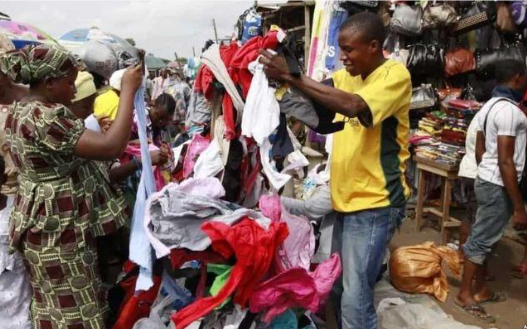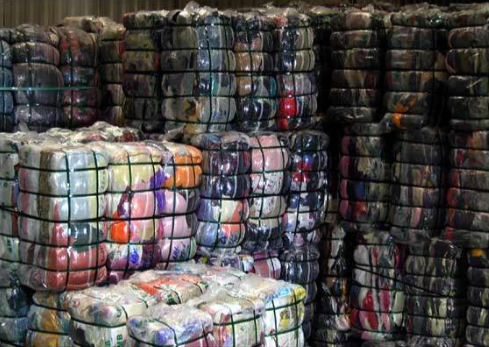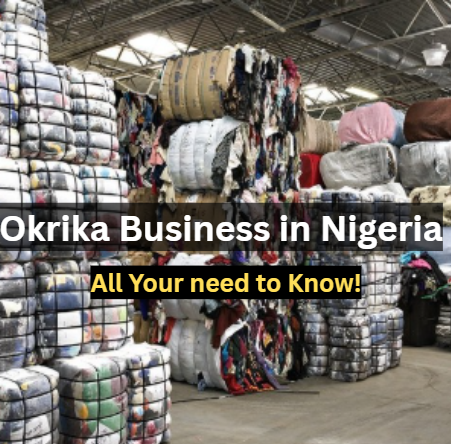The Okrika business in Nigeria has grown into one of the most lucrative small-scale ventures for entrepreneurs looking to start with minimal capital. Commonly known as Okrika clothes or second-hand wear, this business involves selling fairly used but high-quality clothing imported from countries like the UK, USA, and China. Whether you are in Lagos, Abuja, Port Harcourt, or any part of the country, there is always a strong demand for affordable fashion — and that’s where Okrika sellers cash in.
Many people are searching for the secret of Okrika business, how to start Okrika business, and even “is Okrika business profitable?” because they’ve heard of traders making impressive profits from just a few bales of clothes. The truth is, Okrika is not just about buying and selling — it’s about knowing the right suppliers, picking quality items, understanding your market, and selling at the right price.
In this detailed guide, you’ll learn everything you need to know about starting a profitable Okrika business in Nigeria, from finding the best Okrika markets in Lagos, sourcing bale suppliers at the right price, understanding how much Okrika bales cost in Cotonou, to creating a winning Okrika business plan. By the end, you’ll have the knowledge to start small and grow big in this competitive but highly rewarding industry.
I kindly advise you to follow the article to the end so that you will not miss any important information. So what are you waiting for? Grab a seat, relax, and continue reading!
Also Check: Money Lessons I Wish I Knew Before Starting My First Business
What is Okrika Business?
The Okrika business refers to the buying and selling of second-hand clothes, shoes, and fashion accessories imported into Nigeria from foreign countries such as the UK, USA, Canada, and China. In Nigeria, these items are popularly called Okrika clothes or bend-down select. The name “Okrika” actually originates from a town in Rivers State, where the trade first gained popularity many decades ago before spreading nationwide.

Okrika clothes are often sold in large bundles called bales. Each bale contains a variety of items — from children’s wear, jeans, and shirts to jackets, corporate attire, and even designer pieces. These goods are graded based on quality:
- Grade A: Top-quality, gently-used clothing that looks almost new.
- Grade B: Good-quality items but may have minor signs of wear.
- Grade C: Lower-quality pieces, often sold at cheaper prices.
The Okrika business in Nigeria is more than just a way to provide affordable clothing — it is a multi-million-naira industry that supports thousands of traders and wholesalers across the country. From busy markets in Lagos to rural towns, Okrika remains in high demand because it gives customers access to quality fashion at a fraction of the cost of brand-new clothes.

Also check: Why Most Nigerians Think Money Is Evil — And How It Holds Us Back
Is Okrika Business Profitable?
If you’ve been wondering, “Is Okrika business profitable?” — the simple answer is yes, and in many cases, it’s far more profitable than some other retail ventures with the same startup capital. The secret lies in the high demand for affordable yet stylish clothing across Nigeria, combined with the low cost of sourcing Okrika bales.
Do You Know?
- We offer expert financial advisor services that can help you achieve your goals.
- We help individuals gain financial freedom.
- We mentor individuals to become successful entrepreneurs.
- We coach or mentor individuals in various digital skills (such as Cybersecurity, Web Design and Development, content creation, Mobile App Development, Data Analysis and Data Science, Digital Marketing, etc).
Here’s a breakdown of why this business is profitable:
- Low Startup Capital, High Returns
- You can start small with just one bale of clothes, which can cost anywhere from ₦80,000 to ₦250,000 depending on the type and quality.
- A well-selected bale can generate double or even triple the purchase price in revenue once sold.
- High Demand Across All Income Levels
- Okrika clothes are not only for low-income earners. Many middle-class Nigerians prefer them because they often get high-quality, durable clothes at bargain prices.
- Flexibility in Selling
- You can sell in physical markets, from home, or online via platforms like Instagram, WhatsApp, Facebook Marketplace, and Jiji. This flexibility increases your reach and profit potential.
- Multiple Product Categories
- From children’s wear to corporate shirts and winter jackets, the variety in Okrika allows you to serve different customer needs — boosting sales volume.
Example Profit Calculation:
Let’s say you buy a Grade A bale of ladies’ tops for ₦150,000. After sorting and pricing, you might sell each top at ₦1,500–₦3,000 depending on quality. If the bale contains 200 tops, that’s a potential ₦300,000–₦600,000 in total sales — giving you a profit margin of 100% to 300%.
Also Check: Why Your Financial Struggles Are Not From Village People
The Secret of Okrika Business
Many people enter the Okrika business thinking all it takes is to buy a bale and start selling. While that’s technically true, the real money is made by those who know the secret of Okrika business — and that secret is a mix of quality selection, trusted suppliers, and smart selling strategies.
Here are the key secrets every successful Okrika seller knows:
1. Source from Reliable Suppliers
Your supplier is the backbone of your business. A trusted supplier ensures you get genuine Grade A bales that will attract repeat customers. Avoid unknown sellers who offer “too-good-to-be-true” deals — they might be selling mixed or damaged goods.
2. Master the Art of Bale Selection
Not all bales are created equal. Learn to choose bales based on your target market. For example, if you sell to young professionals, go for corporate wear or trendy tops. If you target families, children’s clothes may sell faster.
3. Build Relationships in the Market
Okrika markets are tight-knit communities. Being friendly with other traders can help you get early access to the best bales before they’re displayed publicly.
4. Sell Through Multiple Channels
Don’t limit yourself to just physical markets. Many successful traders make huge sales by posting their Okrika clothes on Instagram, Facebook Marketplace, WhatsApp status, and Jiji. This not only widens your reach but also lets you sell at slightly higher prices.
5. Sort, Wash, and Present Neatly
Presentation matters. Washing, ironing, and neatly displaying your Okrika clothes can make customers happily pay more, especially online buyers who judge by pictures.
In short, the secret of Okrika business is to treat it like a professional retail operation: source smart, sell strategically, and build customer trust.
Also Check: The 7 Worst Money Habits Nigerians Need to Unlearn
How to Start Okrika Business in Nigeria
Starting an Okrika business in Nigeria is not complicated, but it does require planning, smart sourcing, and an understanding of your target market. Whether you’re starting small or aiming to go big, follow these steps to set yourself up for success.
Step 1: Conduct Market Research
Before spending any money, visit local Okrika markets in Nigeria (especially in your city) to see what sells the most.
- Identify trending categories (e.g., children’s clothes, jeans, jackets, corporate wear).
- Observe how experienced sellers display their goods and interact with customers.
Step 2: Choose Your Niche
While you can sell a mix of everything, focusing on a specific category helps you build a loyal customer base. Popular niches include:
- Children’s wear
- Women’s fashion (dresses, blouses, skirts)
- Men’s fashion (shirts, trousers, jackets)
- Seasonal clothes (hoodies, winter jackets, school uniforms)
Step 3: Find Reliable Okrika Suppliers
The success of your business depends on sourcing quality bales. You can get suppliers from:
- Major Okrika markets in Lagos (we’ll discuss the best ones later)
- Cotonou importers who sell bales directly
- Verified wholesalers in your local market
When researching, use the keyword “where can I get Okrika bale supplier with price” to find competitive options.
Step 4: Secure Your Startup Capital
Depending on your niche and location, you can start with as little as ₦80,000 for a single bale. Higher-quality bales cost more but often yield better profits. If you don’t have enough capital, consider starting with “open-bale” purchases — buying items individually from another seller’s bale and reselling.
Step 5: Buy Your First Bale and Inspect It
Always inspect the bale before buying. Check for:
- Quality of clothes
- Types of items (to ensure they match your niche)
- Possible defects
Step 6: Sort, Wash, and Price Your Items
Sorting helps you separate the best pieces (Grade A) for higher pricing and set affordable prices for lower grades. Clean clothes attract more buyers and higher sales.
Step 7: Sell Online and Offline
Maximize sales by selling both at physical markets and online.
- Offline: Market stalls, home-based sales, pop-up stands at events.
- Online: Instagram, WhatsApp, Facebook Marketplace, Jiji.
Following these steps will give you a strong start in the Okrika clothes business in Nigeria and help you avoid beginner mistakes.
Also Check: Top 10 Fast-Growing Businesses in Nigeria with High Profit Potential
Okrika Bale Suppliers and Prices
Finding the right Okrika bale suppliers is one of the most important steps in building a profitable business. The quality of your supplier determines the quality of your clothes, which directly affects your sales and customer loyalty.
If you’ve been searching for “where can I get Okrika bale supplier with price”, here’s a detailed breakdown to guide you.
Common Sources for Okrika Bales in Nigeria
- Major Okrika Markets in Lagos
- Markets like Katangowa (Super) Market, Aswani Market, and Balogun Market are popular for wholesale Okrika clothes.
- They have a wide variety of suppliers selling everything from children’s wear to designer jeans.
- Cotonou Suppliers
- Many traders travel to Cotonou in Benin Republic to buy bales directly from importers.
- Bales from Cotonou are often cheaper but require extra transport and customs clearance costs.
- Regional Wholesale Markets
- Aba in Abia State, Onitsha in Anambra State, and Kano in the North are also major hubs for Okrika bale distribution.
- Verified Online Suppliers
- Some suppliers now operate via Instagram, WhatsApp, or Facebook. Ensure you request video proof of bale opening and check reviews before payment.
Also Check: The World Is Changing Fast! 5 Powerful Reasons You Must Learn a Digital Skill Today
How Much is Okrika Bale in Nigeria?
Prices vary depending on the type of clothing, quality (Grade A or B), and supplier location.
| Bale Type | Price Range in Nigeria (₦) | Notes |
|---|---|---|
| Children’s Clothes | 90,000 – 150,000 | High demand year-round |
| Ladies’ Tops/Dresses | 120,000 – 180,000 | Higher profit margins |
| Jeans/Trousers | 130,000 – 200,000 | Durable and always in demand |
| Jackets/Winter Wear | 100,000 – 160,000 | Seasonal peak sales |
| Mixed Bale (Assorted) | 80,000 – 140,000 | Variety but mixed quality |
How Much is Okrika Bale in Cotonou?
If you source directly from Cotonou bale suppliers, you might find prices slightly cheaper:
| Bale Type | Price Range in Cotonou (₦ equivalent) | Notes |
|---|---|---|
| Children’s Clothes | 70,000 – 120,000 | Best for bulk purchases |
| Ladies’ Wear | 100,000 – 150,000 | Requires customs clearance |
| Jeans/Trousers | 110,000 – 160,000 | Popular for urban markets |
Tip: Always factor in transport, clearing fees, and possible customs charges when buying from Cotonou.
With the right supplier and smart pricing, you can maximize profits and build a steady customer base in the Okrika business in Nigeria.
Also Check: Top 10 Safe Investments With High Returns in Nigeria
Best Okrika Markets in Nigeria
One of the biggest questions new sellers ask is, “What is the best Okrika market in Lagos?” or “Where can I get quality Okrika clothes at good prices?”
The truth is, Nigeria has several markets known for selling high-quality Okrika bales, but some stand out for variety, affordability, and supplier reliability.
Best Okrika Markets in Lagos
- Katangowa (Super) Market – Abule Egba
- Known as the largest Okrika market in Lagos.
- Offers every category: jeans, children’s wear, corporate shirts, dresses, shoes, and bags.
- Open most days, but Mondays and Thursdays are best for fresh bale arrivals.
- Aswani Market – Isolo
- Famous for affordable Okrika clothes and accessories.
- Ideal for small-scale traders looking for Grade B and open-bale options.
- Tuesdays are the main market day for new stock.
- Balogun Market – Lagos Island
- While known for fabrics, Balogun also has sections dedicated to Okrika clothes.
- Good for buying mixed bales and high-quality corporate wear.
Other Popular Okrika Markets in Nigeria
- Aba Market – Abia State
- A major distribution hub for Okrika goods in the South-East.
- Onitsha Main Market – Anambra State
- Known for bulk buying and reselling across Eastern Nigeria.
- Kano Kantin Kwari Market – Kano State
- Popular in the North for wholesale Okrika and mixed goods.
If you’re starting the Okrika business in Nigeria, sourcing from the right market ensures you get quality clothes at prices that leave room for profit. Many sellers start by buying from the best Okrika market in Lagos before expanding to direct imports from Cotonou.
Also Check: 10 Hidden Business Opportunities in Nigeria You Can Start Today
Okrika Business Plan (Mini-Template)
A good Okrika business plan helps you stay organized, estimate costs, and set profit goals. It doesn’t have to be complicated — even a simple plan can guide you from startup to success. Here’s a straightforward template you can follow:
1. Executive Summary
A brief overview of your business.
Example:
“Okrika clothes business in Nigeria focused on selling Grade A and Grade B second-hand clothes for women and children, sourced from the best Okrika markets in Lagos and direct imports from Cotonou.”
2. Business Goals
- Start with one bale of children’s wear within the first month.
- Expand to two bales per month within 6 months.
- Open a small physical shop in one year while maintaining online sales.
3. Startup Capital & Budget
| Item | Estimated Cost (₦) |
|---|---|
| First Bale Purchase | 120,000 – 180,000 |
| Transportation | 5,000 – 15,000 |
| Sorting, Washing, Ironing | 5,000 – 10,000 |
| Stall/Market Space Rent | 20,000 – 50,000 (monthly) |
| Marketing (Online & Offline) | 5,000 – 15,000 |
| Total Estimate | 155,000 – 270,000 |
4. Target Market
- Women between 18–45 years
- Mothers buying children’s clothes
- Young professionals looking for stylish but affordable outfits
- Students on a budget
5. Marketing Strategy
- Sell in local markets (high foot traffic areas)
- Promote on Instagram, WhatsApp, Facebook Marketplace, and Jiji
- Offer bundle discounts (e.g., buy 3 tops, get 1 free)
- Build relationships with regular customers
6. Revenue Projection
If you buy a ₦150,000 bale and sell items for ₦1,500–₦3,000 each, you could make ₦300,000–₦600,000 in total sales, with profits ranging from ₦150,000–₦450,000 per bale (after expenses).
Also Check: How to Make Money Online in Nigeria Without Investment: 10 Legit Ideas That Work
Okrika Business in Nigeria: Final Thoughts
The Okrika business in Nigeria remains one of the most reliable and profitable ventures for both new and experienced entrepreneurs. With a relatively low startup cost, high demand across all income levels, and the flexibility to sell both offline and online, it offers a clear path to consistent income.
Whether you choose to source from the best Okrika markets in Lagos, buy directly from Cotonou suppliers, or start with open-bale purchases, the secret lies in getting quality goods, presenting them attractively, and building loyal customers.
Like every business, success in selling Okrika clothes in Nigeria requires patience, consistency, and smart reinvestment of profits. Start small if you must, learn from each sale, and scale up gradually. With the strategies shared in this guide — from finding reliable suppliers to creating an effective Okrika business plan — you’re well-positioned to turn second-hand clothes into first-class profits.
If you’ve been thinking about it, now is the time to take that first step into the Okrika trade. The market is ready — the question is, are you?
